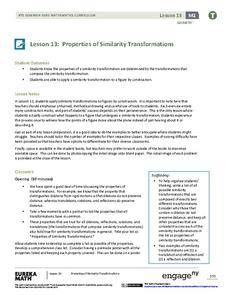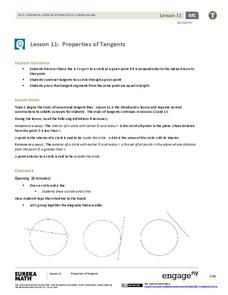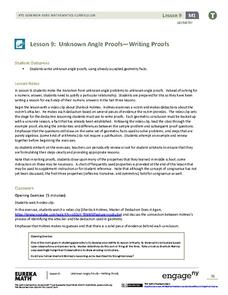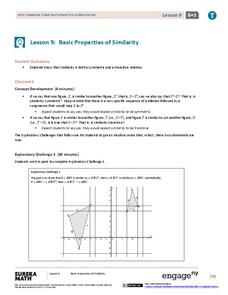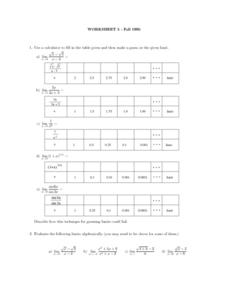Virginia Department of Education
Using Order of Operations and Exploring Properties
If you need some creative ways to teach the order of operations, use a series of activities that focus on properties. Each lesson uses different materials and works as a stand-alone activity, or can build upon the concepts of the last...
EngageNY
Definition and Properties of Volume
Lead a discussion on the similarities between the properties of area and the properties of volume. Using upper and lower approximations, pupils arrive at the formula for the volume of a general cylinder.
EngageNY
Properties of Similarity Transformations
You can explain it, but can you do it? After learners view a sequence of transformations, the next logical step is creating the transformation. Challenge your classes to construct a composition of transformations and verify the...
EngageNY
Properties of Tangents
You know about the tangent function, but what are tangent lines to a circle? Learners investigate properties of tangents through constructions. They determine that tangents are perpendicular to the radius at the point of tangency,...
EngageNY
Rectangles Inscribed in Circles
Putting a rectangular object into a circular one—didn't the astronauts on Apollo 13 have to do something like this? Learners first construct the center of a circle using perpendiculars. They then discover how to inscribe a rectangle in a...
Curated OER
Dilations in the Plane
Tenth graders investigate dilations and explore the dilation transformation before investigating the properties of a dilation using Cabri Jr. High schoolers extend the concept of dilatation to the coordinate plane.
Ahisma Summer Institute
The Power of One - Math in a Different Angle
In this 2-day lesson focused on exponents, middle schoolers will cross the curriculum by engaging in science, history and language arts activities. Exponential growth will be explored using grains of rice on a chess board. Exponential...
Illustrative Mathematics
What is a Trapezoid? (Part 2)
This collaborative activity investigates the meaning of a trapezoid and a parallelogram. It begins by presenting two different definitions of a trapezoid. Learners are to reason abstractly the difference between the two definitions and...
Mathematics Assessment Project
Solving Linear Equations in One Variable
A thorough and professional appearance characterizes a activity on linear equations. Maturing mathematicians are taught to identify and exemplify linear equations with a single variable. They also classify equations according to the...
EngageNY
Unknown Angle Proofs—Writing Proofs
What do Sherlock Holmes and geometry have in common? Why, it is a matter of deductive reasoning as the class learns how to justify each step of a problem. Pupils then present a known fact to ensure that their decision is correct.
Beyond Benign
Packed Up Properties
Determine physical properties of potential packaging materials. Continuing from previous lessons in the series, the resource asks groups to identify physical properties of the substances. They test for conductivity, solubility, water...
Teach Engineering
Understanding Elements
Nothing says organization quite like a table. The third lesson in a six-part Mixtures and Solutions unit teaches young scientists about elements and the periodic table. They learn how the periodic table is organized and about the...
Illustrative Mathematics
The Sign of Solutions
Positive or negative, zero or no solution, are all possibilities for the solution of a linear equation. Here the resource gives examples of linear equations in one variable and their type of solutions. The resource comes with commentary...
West Contra Costa Unified School District
Factoring Quadratic Expressions
Factor in different strategies in a lesson plan for factoring quadratics. Young mathematicians first create tables and area models to factor quadratic trinomials into two binomials by guess and check. Learners then investigate how they...
Illustrative Mathematics
Bank Shot
Young geometers become pool sharks in this analysis of the angles and lengths of a trick shot. By using angles of incidence and reflection to develop similar triangles, learners plan the exact placement of balls to make the shot....
Curated OER
How to Apply Properties in Multiplication
Students study the commutative and associative properties. In this multiplication activity, students review the properties and solve several multiplication problems.
Curated OER
Associative Property of Multiplication
Third graders discover the associative property of multiplication. In this multiplication lesson, 3rd graders explore visual examples of using the commutative and associative properties of multiplication. They also practice solving...
Curated OER
The Distributive Property
Students use a visual to introduce the Distributive Property. The lesson is chronologically numbered and follows a distinct plan. The class works with the teacher to complete the lesson. The plan is not written in a traditional way, but...
Curated OER
Symmetry of the Addition Table
Help your class discover the commutative property of addition with this exploration of the addition table. By folding and coloring the table, a symmetry is found that directs students to an understanding of this crucial mathematical...
Baylor College
What Makes Water Special?
Get close up and personal with a drop of water to discover how the polarity of its molecules affect its behavior. Elementary hydrologists split and combine water droplets, and also compare them to drops of oil. Much neater than placing a...
EngageNY
Basic Properties of Similarity
Does the symmetry and transitive property apply to similarity? The 10th segment in a series of 16 presents the class with a group of explorations. The explorations have pairs show that similarity is both symmetrical and transitive....
EngageNY
Informal Proofs of Properties of Dilations
Challenge the class to prove that the dilation properties always hold. The lesson develops an informal proof of the properties of dilations through a discussion. Two of the proofs are verified with each class member performing the...
Curated OER
Worksheet 5: Property Limits and the Squeeze Theorem
In this math worksheet, students answer 6 questions regarding given limits in a table of data, properties of limits and the Squeeze Theorem.
EngageNY
Properties of Dilations
Investigate dilations to learn more about them. The second segment in a series of 16 provides a discussion of properties of dilations by going through examples. The problem set provides opportunities for scholars to construct dilations.




